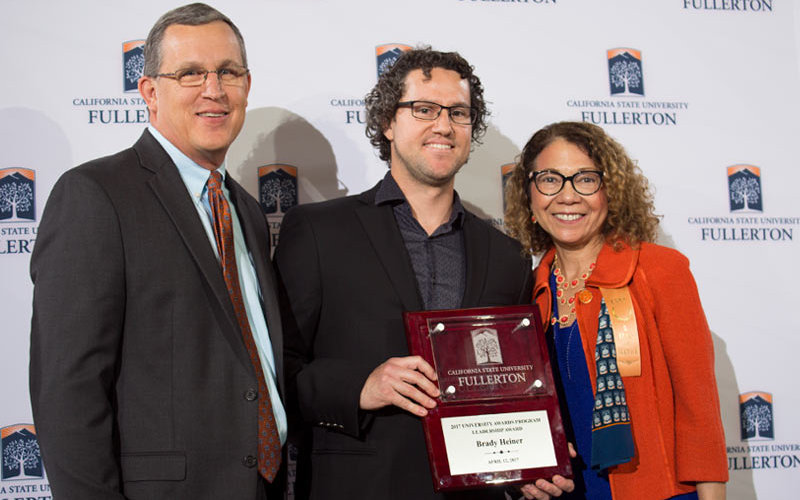
Brady Heiner, director of Cal State Fullerton’s Project Rebound, received the Leadership Award at Wednesday’s University Awards Program in recognition for his vision and perseverance to expand the program for formerly incarcerated individuals to California State University campuses systemwide.
The assistant professor of philosophy known for his research on incarceration and his commitment to prison reform, spearheaded the creation of the system’s Project Rebound Consortium Steering Committee. His leadership of the group helped secure the original $1 million in grants to support the launch of Project Rebound at CSUF and six other CSU campuses, Heather Battaly, professor of philosophy wrote in her nomination.
“Project Rebound simply would not exist at the systemwide level, or at CSUF without him, and it’s because of him that (nearly) 15 students in the CSUF program are already on their way to getting college degrees,” Battaly wrote.
The committee’s chair, Leslie Wong, president of San Francisco State University, wrote in a letter of recommendation: Heiner is a “first-rate, tireless scholar,” whose “exemplary” leadership, expertise and passion have proven “invaluable” to the design and launch of Project Rebound.
Eight students are enrolled in CSUF’s three-year pilot program announced less than a year ago, and one student is set to graduate in May. Five more students are enrolled to start classes in the fall, and outreach has connected CSUF with 300 additional perspective students, Heiner said.
“The colleague that nominated me is one that I hold in great esteem, and I’m particularly grateful and humble to receive her nomination and to receive the award,” Heiner said. “I hope the award is a signal of the institution’s support and that there is a long-term sustainable place for the program at Cal State Fullerton.”
Brady has helped secure more than $1 million in renewed public and private funding for Project Rebound’s expansion onto seven CSU campuses, including about $119,000 for CSUF’s program.
Project Rebound, modeled after the San Francisco State program, offers special admission, tuition support, textbook stipends, meal vouchers, academic advising and mentoring to formerly incarcerated men and women. Its aim is to embrace the 95 percent of people who are incarcerated who return to their communities and to combat recidivism with education by easing their struggles with employment, transportation and housing, Heiner said.